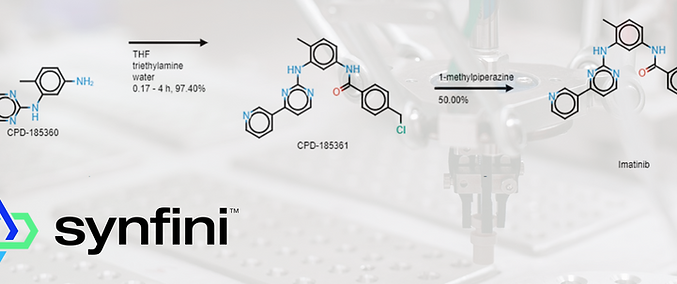
Synfini: Launched in 2023 to Address a Critical Unmet Need for Intelligent Chemistry

Synfini, Inc. was launched in September 2023 to address a critical, unmet need for intelligent chemistry in the $52B Drug Discovery market. The Synfini platform boasts the world’s first AI “Large Chemistry Model”, a multi-scale, robotic data generation system, and a vast AI chemistry dataset. Despite its nascent vintage, Synfini’s scientific foundation began years ago, with more than $40m worth of non-dilutive development, at one of Silicon Valley’s most storied research institutions, SRI International.
Synfini began as a research effort in 2016. At the time, SRI scientists believed the combination of virtual and physical chemistry could enable rapid development of synthetic molecules in a fraction of the time and at much lower cost. They secured a $12.8M grant from the Defense Advanced Research Projects Agency (DARPA) to address these challenges. With this investment, SRI scientists created SynRoute ™, an AI-driven synthesis planning application that can generate viable synthetic routes for about 85% of FDA-approved small-molecule drugs – in less than a minute per compound. They also created AutoSyn™, the first multi-step chemistry synthesis platform with in-line analytics, that could perform the scalable production of high-value materials in a single run instead of the 3-5 steps required by other approaches. These systems were demonstrated with the US Department of Defense (DoD) Labs, who used Synfini to gain rapid, reliable access to high-value molecules.
In 2019, Synfini focused on accelerating the discovery of new pharmaceutical molecules with an additional $20M from DARPA’s Accelerated Molecular Discovery (AMD) program. At the time, almost every DoD field felt the impact of breakthrough AI, such as LLM’s. And yet, medicinal molecule development lagged, largely due to AI’s lack of symbolic knowledge of chemistry and insufficient training data. Synfini was extended to include closed-loop discovery systems, AI models to drive experimentation through iterative design-make-test-analyze (DMTA) cycles, and a major advance in SRI’s neuro-symbolic AI system (DASL). This unification resulted in the world’s first Large Chemistry Model (SynLCM) capable of high-accuracy molecular predictions with an order of magnitude less data than alternate approaches. Synfini showed its efficacy in the rapid discovery of new antiviral inhibitors against SARS-CoV-2 and anti-inflammatory compounds.
Over subsequent years, with DARPA primary grants and commercial support from pharmaceutical, industrial and biotech leaders, Synfini’s total non-dilutive development exceeded $40m.
Today, the Synfini platform is an advanced, automated molecular discovery platform with the potential to transform the drug discovery industry. Targeted to the $52B drug discovery market, Synfini accelerates the translation of drug concepts into drug candidates by 50% with a 40% savings over traditional methods. Synfini’s data already encompasses approximately 60% of known chemistry. Through its Drug Discovery Partner program, Synfini has a significant pipeline of validated targets that address some of the most serious oncology and longevity challenges of our time.
Synfini is not alone in the chemistry discovery automation field, but its unique combination of a neuro-symbolic AI LCM, multistep synthetic route planning, automated robotic data generation, and vast chemistry data offers several competitive advantages. In addition, its extensive, $40M+ non-dilutive development to date and laser-focused patents represent a significant barrier to entry.
Synfini, Inc., launched in September 2023 and is based in Silicon Valley. The Company is led by Doug Donzelli, CEO, who led the spinout from SRI International along with cofounders Peter Madrid, Ph D., Head of Scientific Development and Nathan Collins, Ph D., Head of Strategic Alliances and Development. Mr. Madrid and Mr. Collins were part of the original scientific team that developed Synfini at SRI.